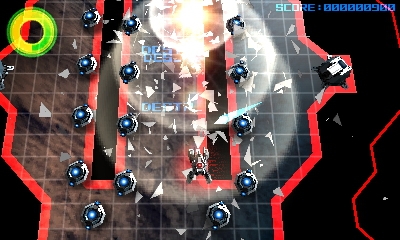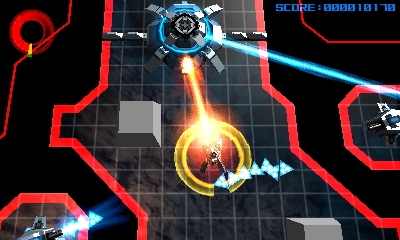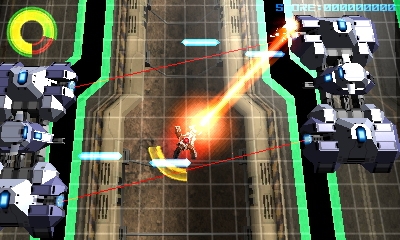Kokuga Review
From the man who brought you the seminal bullet-hell shooters Radiant Silvergun and Ikaruga (Hiroshi Iuchi), comes a shooter that at face value, appears to be a far slower-paced game than its stable-mates. But Kokuga is just as much an adrenaline shot to the heart as any shmup worth it’s salt, and proof that even a relatively simple idea can still be exciting, even in this day and age.
It is set in a futuristic world, against the backdrop of a war between two neighbouring countries, “A” and “B”. The mere fact that the country names are so bland should be enough warning that an ongoing narrative isn’t Kokuga’s strong point. However, the game clearly wants you to get down to the nitty-gritty of blowing stuff up with your tank, so we can forgive G.Rev for the lack of narrative.

Right off the bat, you’re given access to any of the game’s 12 normal stages, presented on a grid. Once you complete a level, you can then tackle any adjacent level on the grid. There are also three “Final” levels, that effectively end the game. It is entirely possible to pick a starting level next to these Final levels, and then immediately tackle that Final level. It’s also possible to play as many levels as you want before tackling a Final stage of your choosing. Should you want to play a level again in that playthrough after already finishing it, its difficulty level will be increased (you can also choose between Normal, Hard, Ultimate and Boss Rush difficulties).
What this all means is that you are free to choose how long or short your run-through is. Because you can’t save your progress (other than your scores), this flexibility is certainly an interesting idea, allowing you to customise your entire route through the game. However, it would have made more sense to allow progress to be saved, and provide you instead with branching paths.
Once a level has been selected, its instantly apparent how limited the Kokuga tank is in terms of movement and initial offensive abilities. Controls are minimal, with the Circle Pad/D-Pad for movement, the L & R shoulder buttons to rotate your turret, and B to fire your weapon. Kokuga only allows you to fire one bullet on screen at any one time, while movement is sluggish (which makes sense for a tank). Meanwhile, the enemy units have far superior firepower with guns that fire faster, and launch homing rounds, or fire multiple shots at once.

It’s a game that’s about facing a flurry of firepower while wrestling with the limitations of your own vehicle. The result is a slower-paced, almost strategic take on the shmup formula. You’re able to play the game at your own pace, finding cover where possible and retreating when necessary. You’d be mistaken for thinking that the unusually slow pace would make for an easier, more relaxing shooter – but you’d be wrong. While never coming close to the chaos of a bullet-hell shooter, when you’re under fire from all directions, every enemy engagement is a tense affair as you try and make your single shots count.
Luckily, the game features power-ups, with Kokuga adopting a rather unique take on the schmup staple. On the 3DS touchscreen, you are provided with four cards, each one representing different power-ups from two categories (attack and support). Ranging from Shields to Rapid Fire, and even an energy-sapping Final Attack, these random cards can be used when touched, with another card taking its place each time. You are given 20 cards on each level, and it’s down to you when, and how, you use them: do you use a screen-clearing Napalm when things are a little hairy, or do you save it for the boss at the end of the level?
Another unique gameplay mechanic is how each level is set out. Levels are almost split into sections, with each part ending with the destruction of an enemy structure. If you destroy every enemy leading up to this structure, it glows blue and its destruction will award you with a small amount of health replenishment . However, blow this structure up as soon as you can, and it’ll instantly destroy the platoon of enemies leading up to that point. It’s another example of a game that is as much about strategy as reaction times and itchy trigger fingers.

As you can imagine, each level ends with a boss fight, each one of varying difficulty. You may even find some of the levels leading up to them much harder than the bosses themselves. But rest assured, Kokuga will provide enough of a challenge to satisfy all but the most elite of shmup veterans out there. With each of the game’s levels lasting around 10-15 minutes, plus the ability to select from multiple difficulties; there should be something here to appease shmup fans of all abilities. There’s also four-player cooperative play, via Download Play or by everyone owning a copy of the game. Sadly, I couldn’t test it out – but it sounds like it could be a fun addition.
Kokuga certainly feels like a lost Sega Saturn shooter, with visuals and audio that are incredibly reminiscent of that period in gaming. The musical tracks are great, while sound effects have a real punch to them. The visuals are very simple, with assets drawn with the most basic of polygons, but which compliment the simple VR-style environments – especially when viewed in 3D. It’s just a shame that the majority of Kokuga’s levels are very similar. At times, it’s repetitive, as there are really only two different types of environment: the VR-style landscapes, where most of the levels take place, and the futuristic/industrial areas where the Final three levels take place.
VERDICT: It’s refreshing to see a game of this genre that is so simple and accessible in terms of mechanics, while also providing enough challenge for purists. Being able to play the game at your own pace and in your own way makes Kokuga a very unique prospect. Although a great deal of repetition is involved, and the slow controls may be enough to put people off, Kokuga is a decent example of a genre that isn’t getting enough new ideas these days.

VERY GOOD. An 8/10 is only awarded to a game we consider truly worthy of your hard-earned cash. This game is only held back by a smattering of minor or middling issues and comes highly recommended.




